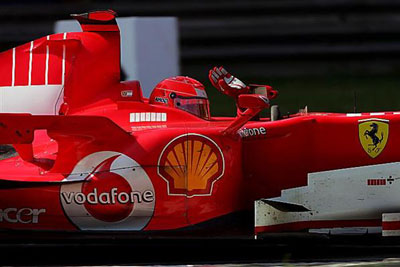Post quoted directly from: formula1.com
After 90 wins, 1354 points and seven world championship titles, Michael Schumacher has announced he will retire at the end of this season. Statistically the greatest driver the sport has ever seen, Schumacher has, over the past 16 years, set a new standard to which younger drivers can only aspire. He may have courted controversy at times, but with his departure, the sport will lose one of its leading lights.

Born on January 3, 1969, Schumacher’s beginnings were surprisingly unremarkable. The son of a bricklayer who also ran the local kart circuit, the young Michael took to his father’s track like a fish to water. He won his first championship at the age of six – an early demonstration the natural talent and raw speed which have since defined his career.
Successive teenage triumphs in Formula Ford and Formula 3 followed and established his reputation as a driver to watch. By his early twenties, the Formula One fraternity had finally taken notice and in 1991 the Jordan team took a gamble, asking him to stand in for a jailed Bertrand Gachot at Spa. Schumacher seized the opportunity with characteristic confidence. He qualified seventh on the grid, impressing rival team Benetton so much they offered him a permanent race seat for the rest of the season.
The talent which had carried him this far now blossomed with Benetton’s backing. At the 1991 Italian Grand Prix, Schumacher finished fifth, claiming the first of four points he earned that year. The next season, he enjoyed a maiden win in Belgium, racked up 53 points and beat his more experienced team mate Martin Brundle to take third in the championship. A year later he was fourth in the championship and reigning supreme within the team.
The rest has become the stuff of history. Motivating Benetton to greatness, Schumacher became the lynch pin of a group of immensely capable people. His dedicated work ethic and passion for winning paid off with back-to-back drivers’ titles in 1994 and 1995. Just three years into his Formula One career and Schumacher was well on his way to becoming a legend.
In 1996, the world champion made a brave move. After four seasons with Benetton, he signed to Ferrari – a team which hadn’t won a championship in almost 20 years. Arriving in Maranello, Schumacher set about rejuvenating the Italian squad, attracting two of the founder members of his title-winning outfit at Benetton to join him later that year. Ross Brawn became technical director and Rory Byrne chief designer.
Schumacher’s first season at Ferrari was a trying one. Nevertheless, relying for the most part on his natural talent, he took three victories out of an under-performing car. By ’98, things were looking more promising and he finished second overall in the title race to Mika Hakkinen. Then in 1999, Schumacher was forced to show his mettle once more after a heavy crash in Silverstone broke his leg and put paid to his title chances for another year.
It was during these early days at Ferrari, when his stakes were down, that Schumacher’s determination and obsessive dedication shone through. As a result, in 2000, everything finally slotted into place and Schumacher, after winning nine races, became the Italian team’s first world champion in 21 years. The German legend would continue winning for the next four seasons, racking up 39 victories and four further championships. He dominated the sport in a way never seen before and firmly ensconced himself in the record books.
Only in 2005, with the rise of Fernando Alonso and Renault, did that dominance begin to wane. Then, as in ’96, Schumacher’s strength of mind came to the fore, as he pushed an uncompetitive car to go faster. The result was third in the championship – five places above a team mate in identical machinery. And in 2006 Ferrari are back and fighting, revived in small part by Schumacher’s resolute ambition and refusal to lie down. Even now, at the age of 37 and heading into retirement, he is still fighting for every win.
Of course, such success rarely comes without controversy, and Schumacher has courted his fair share over the years. His first title in 1994 was tainted (and clinched) with a timely collision with the Williams of rival Damon Hill. Then in 1997, he was stripped of second place in the championship after crashing into Jacques Villeneuve – another title challenger – in Jerez. And more recently the German’s ethics have been called into question following his qualifying accident in Monaco this year.
Schumacher’s insistence on number-one status at Ferrari also drew criticism from some quarters. Eddie Irvine, Rubens Barrichello, and Felipe Massa were all compliant number twos and doubtless played a role in his success. But that cannot diminish the great on-track rivalries Schumacher enjoyed – and won – with the greats from other teams. The likes of Hill, Villeneuve, Hakkinen were all champions themselves, but in the long term none could match his all-round ability. Be it speed, natural talent, ruthlessness or hard work, Schumacher had it all. He rarely made mistakes, his prowess in the rain has been well documented, and he has become so attuned to the development of the cars he drives that he can continually adapt their set-up mid race to his advantage.
The other world champion to leave the sport this year, Jacques Villeneuve, questioned whether Schumacher’s legacy will be as long-lasting as that of Fangio, Senna or Prost. But with 90 wins, 68 pole positions, 75 fastest laps, 1354 points and those seven world titles, most would say Michael Schumacher will never be forgotten – or beaten!




Leave A Comment